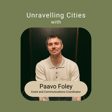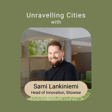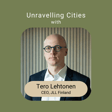Become a Creator today!Start creating today - Share your story with the world!
Start for free
00:00:00
00:00:01

Sustainable urban development means emphasising the existing
As long as we have empty spaces in the city, we are not tackling climate change, says architect Henna Helander. In this episode, Natalia and Henna discuss how sustainable urban development and great design relate, and how to keep cities liveable.
Transcript
Introduction of Hena Hellander
00:00:19
Speaker
Hello and welcome to the Unraveling Cities podcast. And it's me again, Natalia, here with a very interesting guest. Today we will speak from architect to architect. So of course we have taken very different paths in life, but anyhow, both having the same mentality as well. And
00:00:44
Speaker
She is, my guest today, an experienced architect and leader. You have many different boards. You have experience for public and private side as well. And well, a lot of knowledge from the construction industry, cities, housing. With no further ado, here is Hena Hellander. So welcome. So nice to be here. And I'm very happy you're here.
00:01:12
Speaker
You were probably in the first times when we started Chaos as well back then. Yes, it's a long time ago and it's so nice to see that you are already 12 years. Yes, in a new office, yes, or new.
Hena's Architectural Journey
00:01:31
Speaker
But welcome, Henna, and well, you can tell a bit more about your background to our listeners, like you can introduce yourself. Thank you.
00:01:40
Speaker
Yes, I have experienced a private sector about 10, 15 years early. I was working as an architect, a real architect, designing houses and public buildings. I had also my own company, and we invented this concept of new laws.
00:02:08
Speaker
for the architecture competition in 1997 already. So you can see it has been a long ago. But then I was working in the public sector at about 10 years for the city of Helsinki as a builder for housing. Adetem, Hangeston, Italopalika,
00:02:36
Speaker
Ever is that in English? The project manager or main designer, lead designer, yes. Something like that. I was an architect and responsible for all building permissions in Helsinki. And after that, I did some other things.
Preservation and Restoration Projects
00:02:58
Speaker
Yeah. Yeah. And lately, I was CEO for Bynos and Network.
00:03:06
Speaker
So it was a big jump again to the totally different area, which didn't have anything to do with architecture. Yeah. But I've seen that you've worked in a lot of projects that need like, was it like preservation restoration or? Yeah, exactly. I love buildings which have
00:03:32
Speaker
both potential and problems. I think that you are a star now in the market that we are, where we need to pick up buildings and renovate them. I think your profile fits very well in this moment. Me too, because I also know some, I have like, let's say basic knowledge of sort of everything with touch construction and
00:04:03
Speaker
building industry and also city planning, I have done that as well.
Leadership in the Architect Association
00:04:11
Speaker
Or not only in Helsinki, but also in Toroko and in the smaller places. And then of course, I totally forgot. I was also the president of Architect Association. Yeah.
00:04:29
Speaker
Here in Finland. In Finland, yes. Association of Architects here suffer. Yes, suffer for five years. Wow, but that's really, really interesting. How many architects do we have here in Finland? We have approximately 3,500. Wow. Yes, and about 80% of architects belong to suffer. Wow.
00:04:58
Speaker
That's a very big number. It's an extremely big number. Yes. So we could say that in Finland, we find a lot of tech, but a lot of design as well. Yes, that's true. It's a really good combination. I agree. As you, you are more professional. So on the other side, I'm on the field.
00:05:28
Speaker
Yeah, I'm trying to have a mixture of those, yes, but once in a while I still like, you know, I'm thinking that I missed the design, this, you know, part as well, the creative side. Yes, yes.
Sector Experience Comparison
00:05:45
Speaker
Looking at this at your background, I wanted to ask because it's quite a nice, rich experience you have.
00:05:57
Speaker
And you have been, you said 10 years in private and 10 years in public. I won't ask you which one is better, but what did you enjoy about both sides? I mean, what are the highlights of each one? Yes. I like the rhythm of private sector. I'm a fast person, so I like that things happen fast.
00:06:24
Speaker
Yeah. And it happens in private sector. And I also entrepreneur entrepreneur as my soul is. Yeah. But I also like public sector a lot. When it comes to the city, we need such a long time span and also public sector can provide it. Yeah.
00:06:53
Speaker
And I also like the history of cities and so that the people can attend discussion and so on. It takes time. It's city is not like one person's idea and it shouldn't be. So public sector is so important when it comes to the city planning.
00:07:26
Speaker
Yeah, I think you're touching to very interesting points because I agree with you. I think that that speed from the private side is super nice to have, especially when you're innovating. You want to see like,
00:07:45
Speaker
Maybe not positive results, but you want to see where is this leading, you know, very quickly. Yeah. Yeah. And as we say in this sort of like fail fast. Yes. And, uh, on the other side, I think I understand you perfectly. And I think that's the passion that he's driving chaos as well. People, but then I would say that you're.
00:08:08
Speaker
an innovator or really these kind of persons that we need in society, you know, that are questioning the status quo. So you want to do things fast, you want to test, but at the same time, you're doing it for a purpose, for the people behind.
City Planning and Pilot Projects
00:08:27
Speaker
Yeah, testing and pilot things are, I think, very important. Things we really want to have, for example, in the city, and just go by the book.
00:08:38
Speaker
And by the law, you can also change processes and you have to change them by time to time. But then you need to know what you are really, what is the point you are aiming at? Yes, I agree with you. I think that we should follow laws. I mean, they bring certain order.
00:09:02
Speaker
Yes. To the chaos that cities are. Yes. Pun intended. But I agree that there's laws that don't apply to our current days. And we always have to be open to go back to them and say, does this still apply? Exactly. Yes. Exactly. And we are seeing that in a lot of social things, like equal rights and Me Too movements and, you know,
00:09:31
Speaker
accepting immigration as well, or animal rights, we should do the same for cities. Exactly, exactly. And those old processes and laws, they also keep old structures up.
Market Risks in Housing
00:10:00
Speaker
In our last podcast, we have Tero Lektonen from JLL and I was asking about these market trends, you know, from the economical side and macroeconomics. And he was mentioning that, you know, it is time to focus more in the property and do those things, you know, that are going to keep our residents there or happy or tenants in general. And then we had also
00:10:26
Speaker
Kim Ronca also here as a guest, and he's speaking about community. Exactly. We are bringing small cities, you know, like this community feeling to the big cities, being local. Yes. And you're saying something similar. So I think the different point of views are aligning that our cities are not working as they have been built. Yes. Yes. And also this one-sided
00:10:55
Speaker
which has been going on for, let's say, 10 years. Now the risks of it are stabilizing. What are those risks that you think? Now we have very similar kind of flats sold and the whole market has sort of collapsed because there have been just one product.
00:11:23
Speaker
Yeah, that's a very good point. You have a very, very good point. When we are offering, well, you mentioned now one single room apartments, which are usually for students on the one that bring like higher return of investment. I have understood that those are also the ones with higher operating costs when you have to renovate and so on. Exactly. And then you have apartments, like family apartments or detached houses.
00:11:49
Speaker
But you're right, we're speaking about a similar product that we are selling to everyone in the world. We haven't really been renovating the built environment. And I think you're right. And we see the risks and the consequences of having that, for example, a lot of isolation when the population is getting older. And also, I would say, from the other side, from young families that are having babies, when they are
00:12:19
Speaker
outside of their circle, because now people are moving more around the world. I don't think they have the support system of leaving kids with the parents or with someone. The state has to always have or provide, for example, daycares. But if we would have more, like you're saying, more products for the people.
00:12:43
Speaker
We could have these type of communities where you can leave your kid with a community, you know, if you have to run an errand or something, and the state doesn't have to be all the time on, you know, to meet your needs. Yes. That's a very interesting point because it has also struck me always when I wrote that in Finland, if there are some problems, you are always waiting for
00:13:11
Speaker
state or city or public sector to help you. But when you have, for example, in let's say in England or in South part of Europe, nobody expected. Yeah. Yeah. I'm asking more what we can do. Yeah. How can we make our environment in such a way that it's really like
00:13:41
Speaker
I think that we are touching a very interesting point here. I love this. This is my passion. Again, I'm not going to say which one is better, but there's good things in both. I mean, yeah, having a safety net from the welfare state, you know, that is, you know, supporting you, of course, because it does.
00:14:10
Speaker
from certain kind of security and peace. Yes. That it's okay we are here, you know? Yes. Yeah. And at the same time, when that doesn't go perfectly, or how can we optimize the resources, you know, in taxes and all of these, by being more creative and community-oriented ourselves? Exactly. And also to be more active
00:14:39
Speaker
that way. Yeah. And it's so strong at us and you have to always survive by yourself. Yeah. But we should also get this other aspect that we have to survive with this community and we have to help each other, not just like
00:15:07
Speaker
survive with themselves and then the state comes. Yeah, I think this is one of the key points that defines Finnish culture. It's like as long as you take care of yourself, then
Finnish Culture in City Development
00:15:24
Speaker
we progress as a society. And that has worked quite well. I mean, Finland has been able to become a
00:15:31
Speaker
a very, very fast growing economy and country. Exactly. We were very poor. Yes, coming from very difficult times until now, like a very prosperous as well. Very safe cities, very digital, economy thriving.
00:15:49
Speaker
But then it seems that there's a glitch in there. When we are getting the older population and when we have been detached so much about society, thinking that we can do it ourselves. I think that that's the way that maybe Finnish cities have been built. Maybe with that mentality. That's true.
00:16:17
Speaker
It really affects us how we meet each other, how we move there, what kind of choices we do and what is our lifestyle. And now we should form
00:16:45
Speaker
transform our cities to support this new kind of lifestyle that we take care of each other more and also this nature kind of thing. And what else? Yeah and maybe you're pointing a good example that we can already see in Finland as a positive thing. Finland has a lot of forests and
00:17:13
Speaker
I think the Finnish Bill environment tries to keep that forest and nature close. And I think when anyone from outside comes and sees that horse starts living in Finland,
00:17:27
Speaker
That's one of the things that they appreciate, the nature, that you didn't have anywhere else. Or of course you do, you have in different forms. But when you start seeing the forest, how it feels in summer and the smells, or in winter, or you realize that snow is not white, but it's actually crystal.
00:17:50
Speaker
the this kind of yeah and it's just like the light coming through crystals yeah and you can only see it's that exactly and then why we expect snow so much during winter
00:18:08
Speaker
And I think that's a positive effect when you are diverse.
Small Towns and Unique Architecture
00:18:13
Speaker
And the importance that nature has over finished lives, it's very strong. So that's a very clear example of how the shape that our cities take will inform our mentality, but also our habits and our mental health. So I agree with you. And you were mentioning now about these little towns.
00:18:38
Speaker
And you had an article also in the newspaper speaking about that. Yeah. About how we should recapture that. And I think there you were mentioning something about the Danish city. I don't dare to pronounce this, but was it Vael? Vael, yeah. I did Vael either if it's correct. And you said that they were having architecture as a driver. So can you explain a little bit more about those, like how can we recapture the vitality of these towns?
00:19:09
Speaker
Yeah, I think the small cities, they almost always have this will to be the biggest cities. Yeah. And I think it's it's not fairly wise to think in that way, but they should analyze what is like interesting in their places and then like make stronger those
00:19:39
Speaker
features which are like the best in that place. And also, for example, this bail, they built some architecture attractions there. For example, my sons were there last summer and took some photos and
00:20:03
Speaker
They thought that it was really surprising place to visit. And they are like 11 and 21 years old. So they are not like people to go off the architecture. They chosen to go to that place before they had to talk with me. And also, those people who are living in
00:20:33
Speaker
little cities. They have quite often very different ideas also what attracts people to come to those cities. They think that building like new buildings is the thing and quite often it's just opposite. They might have like old wooden buildings there or functionalistic buildings there.
00:21:03
Speaker
which is much more interesting for those people who might come than just to have again a very similar kind of block of flats in the city centre than they can have a bigger city. So if they build
00:21:25
Speaker
new things they should build something with take benefits of that place that they have space, their green areas and so on. But they can also take benefits of those old buildings there and transform them sometimes in a very valid way. Yeah.
00:21:53
Speaker
I agree. I think that sometimes in these little towns, we are trying to, or maybe there is no one to defend, you know, anymore. And you get tired, of course, being few citizens there and not having all the infrastructure needed to support. I guess one becomes, you know, one joins the other party. Okay, I will move to the bigger city then, to the closest one. So you're forced to move
00:22:23
Speaker
or change. But I agree with you, there's a lot of architecture that is worth restoring or preserving, especially because it gives identity. Exactly. It makes a difference from the other cities. You need some differences in places. And it shows you the history of different, even in Finland, when you go to the north, you're going to have a lot of differences that you don't have here in the south.
00:22:52
Speaker
And those are beautiful differences as well. I mean, we all are very charmed when we go to, you know, these small villages. And I think some of them have become even gentrified because of that. But I think it's important as well to preserve them. How can we help cities also to build the necessary infrastructure, you know?
Digital Platforms for Revitalization
00:23:15
Speaker
Le Corbusier, so you know him well. He was very functional, a functionalist, and he was saying that sometimes we just preserve buildings out of sentiment, you know. This is very high taxing.
00:23:30
Speaker
you know, thing for the municipality. But I think that if we invest correctly from the municipality, we can still keep that charm. I know at least that in Tampa, we have also discussed this in the council several times where we tried to preserve this old building that was carried away when there was like a big avenue coming as well. And it was
00:24:00
Speaker
the customs. I don't remember now. And the whole project was costing millions just to lift the whole structure and move it a few meters. So there was a very big debate, where should we invest this money? And of course, these are things that we should speak about, but we should have more of this. Yes, yes.
00:24:22
Speaker
Recently, I was speaking with one friend. She's telling me a little bit about a little town in Germany. She described it as a small town. She said that now they recently closed the last grocery store there.
00:24:44
Speaker
And now the elderly cannot go there anymore, but they have to drive kilometers away to find the nearest grocery store. So she was asking me like, is it possible that because we are still people there leaving, but if we don't have any services, we will end up moving. Of course. Yes. So is it possible that somehow we could have this, you know, how would I say like a section
00:25:13
Speaker
in a digital way where we say, Hey, we need someone that makes bread. Come and open your shop here because you have customers. So, and I'm sure there's a lot of people that would want that as a hobby, you know, or a bed and breakfast or whatever it is, or cutting hair or, I don't know, you know, to bring back, you know, to provide affordable housing.
00:25:38
Speaker
bring back services and you establish yourself. But as a normal person, you don't find those places. That's true. I do believe that we should have this matchmaking thing for those who want to provide some services and maybe like part-time services.
00:26:07
Speaker
Yeah, it's interesting because at least in Finland, we are thinking this service is like in a different way than we are thinking about spaces. We should think them together. Yeah, there are no like services almost without spaces. I think
00:26:33
Speaker
It's a very bad thing that some people started to say that, okay, we save the wars. There could be services for elderly people without wars. We are in Finland. We have winter here. Of course we need wars.
00:26:56
Speaker
And when they are doing, for example, this service network studies in the city where you have kids, nursery and so on, they are not really thinking about the spaces at all. And then suddenly, for example,
00:27:23
Speaker
it come to people that, okay, we are closing this and this and this kindergarten and your kids are going there and there and there to this bigger units. Yeah. Like surprise that those people who have been thinking just services, they don't understand that, okay, this means that this building is suddenly empty here and we don't really have
00:27:52
Speaker
anything there and it's also city owns them and so on. Yeah, you're touching another point. It's like there's a layer of the city that exists in the build environment where people leave or some more stable services. But then there's this layer, the empty layer. What happens at certain times of the day when buildings are empty?
00:28:20
Speaker
And then what kind of services do we need in that moment? Exactly. And when we are talking about this climate crisis and so on, I think the biggest thing the cities could do is to have all the spaces we have in the city fulfill with services or fulfill with people so that we don't have empty spaces.
Urban Spaces and Climate Change
00:28:50
Speaker
As long as we have empty spaces, I think all kind of talking about the rest of things, it's like really for nonsense. The scale is wrong. Yeah. Yeah. I think you're touching a very interesting point for real estate as well. And you put it very nicely. As long as we have empty spaces in the city, we are not tackling climate change. Exactly.
00:29:16
Speaker
Yeah, exactly. Yeah. Yes. Yeah. I love this. I think that I will use it as a phrase there.
00:29:33
Speaker
We have been speaking about back and forth what cities should have and the risks and the built environment, but what would you define them as a sustainable urban development? What are the things if you would start from new scratch? What are the things that we know how to embrace?
Sustainable Urban Development
00:29:48
Speaker
First, I think material is like one thing to be in focus.
00:29:57
Speaker
If we are building new ones, we are using so much like virgin materials, but I think we should be very careful with that thing. But it's obvious. Everybody knows it. I hope so. And what we are doing with the city, like the existing city, and I think
00:30:23
Speaker
There are many reasons we should keep or basically say all the buildings we do have. Of course, there are exceptions. I'm not saying that we should not ever put down any demolish any buildings, but basically, we should be very careful that we should at least use the structures, like concrete structures of the building to
00:30:53
Speaker
make the new city or transform it to the city, which is let's say more diverse and more this day. Before we were like, oh, we are still like making this functionalistic kind of city where city has different functional functions and they are like separated. And I think we are now like in
00:31:22
Speaker
post-functional city because of the digitally means so that now for example suburban areas there were like sleeping suburban areas where you went off to work and you always had your working space somewhere else but now when you can have basically everything
00:31:49
Speaker
your own living room, you can have the grocery shop, you can have your sport moment, you can work there, meet your friends, and everything happens through digital.
00:32:08
Speaker
So you were saying about functionalism. We were speaking about sustainable urban development and you said redevelop so new materials we should use carefully and very carefully in demolishing buildings. Use concrete structure of the buildings, you said. Yes. And then more diversity. And then you said we were going from a functional city to a post-functional. Yes. And this, I think
00:32:35
Speaker
now it's time for post-functional city so that we don't divide anymore like living and working and other spaces from each others but we can have them all together and it's mainly because of this digitalization we have we already we are living in that time that
00:33:04
Speaker
Not anymore, even people who are living in the sub-urbans need to go anywhere because they can get everything to their own home, basically. And so I think we should change the whole thinking, this city planning thinking.
00:33:27
Speaker
and also this contrast between nature and city that we are now like covering
00:33:37
Speaker
all the payments with asphalt and I think we should get rid of it and give people such a possibility to anarchy so that they can take away asphalt and put the rose gardens there and so on. So I think
00:34:00
Speaker
our cities should be much more green also because of this water, this extreme climate. Yeah, circumstances and so on. And it serves benefits for people and their happiness.
00:34:19
Speaker
I agree. And I think you're defining how we should look at the future city in a way.
Laws for Sustainable Communities
00:34:28
Speaker
When we think of sci-fi and then we think of future cities and flying cars and stuff like that, I think it should start a bit more with, as you said in the beginning, changing the law. And changing the law gives you space for, even if we would say
00:34:45
Speaker
Let's take this example, like fashion, which is quite fast. And there's no laws being passed in EU level where you have to repair. You cannot just buy another product, but there you have to have the ability to repair socks or pants or whatever, you know, there's more laws coming into like this that you, you know, forcing in a way or getting a discount. If you go to repair, you get a discount in X place or whatever.
00:35:13
Speaker
So I think that we should do something similar to the build environment, the real estate. So if you refurbish a building, you get much more incentives, financial incentives than if you build new. Exactly. And also we have to change our aesthetics, like what we think it's like
00:35:38
Speaker
the best thing. Before we were thinking that the pride and new is the best thing. Now I think new generations are already thinking that vintage clothes are much more interesting and they have like a soul. And I think we should also have the same spirit when we are
00:36:04
Speaker
looking at cities and buildings, that we go to Tallinn to enjoy the Le Skivy button of where the paints are dropping down. Yeah. Why can't we have that also in Finland? We should have like this button and see this, like, choice for old worn down things. Yeah. Yeah. Appreciation for what there has been.
00:36:33
Speaker
in all levels. And also that what I love to have here from the southern part of Europe is how things are finished. The buildings, they really have nice joints and all that they are done from very simple materials. They are so
00:37:02
Speaker
nicely put together. Yes. And I'd love to have that. When you do something new, you do it very nice way and very precisely. But when you have an old thing, then it can be really looking old. Yes. Yeah. But the contrast. Contrast. Yes. Enjoying contrast. Yeah. And I think that goes for everything in life.
00:37:29
Speaker
You know, even when we are trying to find new perspectives, it's not that your old perspective is wrong or right, but it creates much richer when you have a new one as well. Exactly. Exactly. Yeah. This is so exciting. Yeah. You just need to...
00:37:49
Speaker
clean the old way and then start the new one but yes yes yeah i i love that personally like i love all houses and repairing them with new and this japanese um how would you call like in suic yes yes with gold exactly it's a preservation it's something suffer and broken things are not bad
00:38:14
Speaker
We all are broken as well, so yeah, I completely agree with you.
00:38:20
Speaker
I will go very quickly through some very interesting points that you mentioned, just a recap. So you mentioned that we have many things to change now in our built environment and that take a look at the evolves that we have today and try to be more processes. Yes, and processes. So we could be flexible with regulation in some levels, you know, in different things as well.
00:38:49
Speaker
And then you mentioned also that there are certain risks and consequences that the legacy of our built environment has left for us. So for example, something that I really like how you expressed that it was that there has been so far one single offering, one single product. And this also hasn't helped when the markets are collapsing. Exactly. Yeah. So that was very interesting also. We should
00:39:19
Speaker
take a look at different things. Then you mentioned, if you would define sustainable urban development, you said that we should redevelop, we should use new materials less.
00:39:33
Speaker
We should be very careful in demolishing buildings and use the concrete structures that we have of the buildings to build more diversity. Also that this functional city, we used to be living that, but now we are post-functional as well. And that we have to have this fusion of activities or diversity, it's flexible urban
00:39:58
Speaker
planning, you know, a little bit of anarchy as well. You mentioned, yes, and more green for sure. And then I ended with this that I really liked, but you mentioned that as long as we have empty spaces in the city, we are not tackling climate change. Exactly. Yeah.
00:40:30
Speaker
So I'm very happy that you have been with us here. And then I will ask you some very quick rapid fire questions for you. So you need to answer it just like whatever comes to your mind, you know. And don't think about the answer. So I will ask this. Are you ready? No. Maybe you're always ready.
00:40:57
Speaker
Yeah. All right. So where's your dream place to leave? Some kind of factory space somewhere. Okay. Maybe not even in the city center, but a little bit far away. Factory, lofty style. Okay, cool line too. Then public transportation or own car.
00:41:24
Speaker
Walking. Yeah, you're the first one that answers that. Would you rather live in the future or in the past? I think now when we are having this crisis, I think now this is like the moment to be. These. So none of these. All right. Summer or winter?
00:41:47
Speaker
spring you're a rebel in here come on uh what motivates you the most to have better future all right a better future uh morning or evening morning me too what advice would you give to your younger self keep
Episode Wrap-Up with Rapid-Fire Questions
00:42:07
Speaker
your eyes open and be prayed
00:42:13
Speaker
Nice advice. And for everyone listening as well. And then finally, pasta or pizza.
00:42:25
Speaker
You could have said a sushi. At least one correct answer. There's no correct answer. An answer to the question. But Hina, it has been really a pleasure to see you again and having this discussion really.
00:42:45
Speaker
Like, thank you for coming. I have enjoyed so much. Yeah, thank you. Thank you for having us. Thank you. I just always come here. It's wonderful. Nice, nice that you are left with something as well. All right, so thank you for all our listeners. This was our session, and I hope you tune in also to the last ones, to the past ones, and to the future ones as well. Thank you. Bye.







